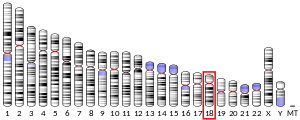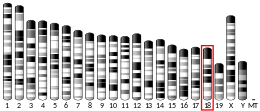SS18
Appearance
(Redirected from SS18 (gene))
Protein SSXT is a protein that in humans is encoded by the SS18 gene.[5][6][7]
Function
[edit]SS18 is a member of the human SWI/SNF chromatin remodeling complex.[8][9][10]
Clinical significance
[edit]SS18 is involved in a chromosomal translocation commonly found in synovial sarcoma.[11]
Interactions
[edit]SS18 has been shown to interact with:
References
[edit]- ^ a b c GRCh38: Ensembl release 89: ENSG00000141380 – Ensembl, May 2017
- ^ a b c GRCm38: Ensembl release 89: ENSMUSG00000037013 – Ensembl, May 2017
- ^ "Human PubMed Reference:". National Center for Biotechnology Information, U.S. National Library of Medicine.
- ^ "Mouse PubMed Reference:". National Center for Biotechnology Information, U.S. National Library of Medicine.
- ^ Shipley JM, Clark J, Crew AJ, Birdsall S, Rocques PJ, Gill S, Chelly J, Monaco AP, Abe S, Gusterson BA (May 1994). "The t(X;18)(p11.2;q11.2) translocation found in human synovial sarcomas involves two distinct loci on the X chromosome". Oncogene. 9 (5): 1447–53. PMID 8152806.
- ^ Clark J, Rocques PJ, Crew AJ, Gill S, Shipley J, Chan AM, Gusterson BA, Cooper CS (Aug 1994). "Identification of novel genes, SYT and SSX, involved in the t(X;18)(p11.2;q11.2) translocation found in human synovial sarcoma". Nature Genetics. 7 (4): 502–8. doi:10.1038/ng0894-502. PMID 7951320. S2CID 20503729.
- ^ de Bruijn DR, Geurts van Kessel A (2006). "Common origin of the human synovial sarcoma associated SS18 and SS18L1 gene loci". Cytogenetic and Genome Research. 112 (3–4): 222–6. doi:10.1159/000089874. PMID 16484776.
- ^ Middeljans E, Wan X, Jansen PW, Sharma V, Stunnenberg HG, Logie C (2012). "SS18 together with animal-specific factors defines human BAF-type SWI/SNF complexes". PLOS ONE. 7 (3): e33834. Bibcode:2012PLoSO...733834M. doi:10.1371/journal.pone.0033834. PMC 3307773. PMID 22442726.
- ^ a b Kato H, Tjernberg A, Zhang W, Krutchinsky AN, An W, Takeuchi T, Ohtsuki Y, Sugano S, de Bruijn DR, Chait BT, Roeder RG (Feb 2002). "SYT associates with human SNF/SWI complexes and the C-terminal region of its fusion partner SSX1 targets histones". The Journal of Biological Chemistry. 277 (7): 5498–505. doi:10.1074/jbc.M108702200. hdl:2066/170683. PMID 11734557.
- ^ a b Perani M, Ingram CJ, Cooper CS, Garrett MD, Goodwin GH (Nov 2003). "Conserved SNH domain of the proto-oncoprotein SYT interacts with components of the human chromatin remodelling complexes, while the QPGY repeat domain forms homo-oligomers". Oncogene. 22 (50): 8156–67. doi:10.1038/sj.onc.1207031. PMID 14603256.
- ^ Yang K, Lui WO, Xie Y, Zhang A, Skytting B, Mandahl N, Larsson C, Larsson O (Jun 2002). "Co-existence of SYT-SSX1 and SYT-SSX2 fusions in synovial sarcomas". Oncogene. 21 (26): 4181–90. doi:10.1038/sj.onc.1205569. PMID 12037676.
- ^ Eid JE, Kung AL, Scully R, Livingston DM (Sep 2000). "p300 interacts with the nuclear proto-oncoprotein SYT as part of the active control of cell adhesion". Cell. 102 (6): 839–48. doi:10.1016/S0092-8674(00)00072-6. PMID 11030627. S2CID 17342132.
- ^ de Bruijn DR, dos Santos NR, Thijssen J, Balemans M, Debernardi S, Linder B, Young BD, Geurts van Kessel A (May 2001). "The synovial sarcoma associated protein SYT interacts with the acute leukemia associated protein AF10". Oncogene. 20 (25): 3281–9. doi:10.1038/sj.onc.1204419. PMID 11423977.
Further reading
[edit]- Fligman I, Lonardo F, Jhanwar SC, Gerald WL, Woodruff J, Ladanyi M (Dec 1995). "Molecular diagnosis of synovial sarcoma and characterization of a variant SYT-SSX2 fusion transcript". The American Journal of Pathology. 147 (6): 1592–9. PMC 1869933. PMID 7495284.
- Brett D, Whitehouse S, Antonson P, Shipley J, Cooper C, Goodwin G (Sep 1997). "The SYT protein involved in the t(X;18) synovial sarcoma translocation is a transcriptional activator localised in nuclear bodies". Human Molecular Genetics. 6 (9): 1559–64. doi:10.1093/hmg/6.9.1559. PMID 9285794.
- Thaete C, Brett D, Monaghan P, Whitehouse S, Rennie G, Rayner E, Cooper CS, Goodwin G (Apr 1999). "Functional domains of the SYT and SYT-SSX synovial sarcoma translocation proteins and co-localization with the SNF protein BRM in the nucleus". Human Molecular Genetics. 8 (4): 585–91. doi:10.1093/hmg/8.4.585. PMID 10072425.
- Eid JE, Kung AL, Scully R, Livingston DM (Sep 2000). "p300 interacts with the nuclear proto-oncoprotein SYT as part of the active control of cell adhesion". Cell. 102 (6): 839–48. doi:10.1016/S0092-8674(00)00072-6. PMID 11030627. S2CID 17342132.
- Tamborini E, Agus V, Mezzelani A, Riva C, Sozzi G, Azzarelli A, Pierotti MA, Pilotti S (Apr 2001). "Identification of a novel spliced variant of the SYT gene expressed in normal tissues and in synovial sarcoma". British Journal of Cancer. 84 (8): 1087–94. doi:10.1054/bjoc.2000.1710. PMC 2363857. PMID 11308259.
- Brodin B, Haslam K, Yang K, Bartolazzi A, Xie Y, Starborg M, Lundeberg J, Larsson O (May 2001). "Cloning and characterization of spliced fusion transcript variants of synovial sarcoma: SYT/SSX4, SYT/SSX4v, and SYT/SSX2v. Possible regulatory role of the fusion gene product in wild type SYT expression". Gene. 268 (1–2): 173–82. doi:10.1016/S0378-1119(01)00412-7. PMID 11368913.
- de Bruijn DR, dos Santos NR, Thijssen J, Balemans M, Debernardi S, Linder B, Young BD, Geurts van Kessel A (May 2001). "The synovial sarcoma associated protein SYT interacts with the acute leukemia associated protein AF10". Oncogene. 20 (25): 3281–9. doi:10.1038/sj.onc.1204419. PMID 11423977.
- Suzuki H, Fukunishi Y, Kagawa I, Saito R, Oda H, Endo T, Kondo S, Bono H, Okazaki Y, Hayashizaki Y (Oct 2001). "Protein-protein interaction panel using mouse full-length cDNAs" (PDF). Genome Research. 11 (10): 1758–65. doi:10.1101/gr.180101. PMC 311163. PMID 11591653.
- Kato H, Tjernberg A, Zhang W, Krutchinsky AN, An W, Takeuchi T, Ohtsuki Y, Sugano S, de Bruijn DR, Chait BT, Roeder RG (Feb 2002). "SYT associates with human SNF/SWI complexes and the C-terminal region of its fusion partner SSX1 targets histones". The Journal of Biological Chemistry. 277 (7): 5498–505. doi:10.1074/jbc.M108702200. hdl:2066/170683. PMID 11734557.
- Yang K, Lui WO, Xie Y, Zhang A, Skytting B, Mandahl N, Larsson C, Larsson O (Jun 2002). "Co-existence of SYT-SSX1 and SYT-SSX2 fusions in synovial sarcomas". Oncogene. 21 (26): 4181–90. doi:10.1038/sj.onc.1205569. PMID 12037676.
- Imabayashi H, Mori T, Gojo S, Kiyono T, Sugiyama T, Irie R, Isogai T, Hata J, Toyama Y, Umezawa A (Aug 2003). "Redifferentiation of dedifferentiated chondrocytes and chondrogenesis of human bone marrow stromal cells via chondrosphere formation with expression profiling by large-scale cDNA analysis". Experimental Cell Research. 288 (1): 35–50. doi:10.1016/S0014-4827(03)00130-7. PMID 12878157.
- Perani M, Ingram CJ, Cooper CS, Garrett MD, Goodwin GH (Nov 2003). "Conserved SNH domain of the proto-oncoprotein SYT interacts with components of the human chromatin remodelling complexes, while the QPGY repeat domain forms homo-oligomers". Oncogene. 22 (50): 8156–67. doi:10.1038/sj.onc.1207031. PMID 14603256.
- Iwasaki T, Koibuchi N, Chin WW (Sep 2005). "Synovial sarcoma translocation (SYT) encodes a nuclear receptor coactivator". Endocrinology. 146 (9): 3892–9. doi:10.1210/en.2004-1513. PMID 15919756.
- Fernebro J, Francis P, Edén P, Borg A, Panagopoulos I, Mertens F, Vallon-Christersson J, Akerman M, Rydholm A, Bauer HC, Mandahl N, Nilbert M (Mar 2006). "Gene expression profiles relate to SS18/SSX fusion type in synovial sarcoma". International Journal of Cancer. 118 (5): 1165–72. doi:10.1002/ijc.21475. PMID 16152617. S2CID 12084422.
- Perani M, Antonson P, Hamoudi R, Ingram CJ, Cooper CS, Garrett MD, Goodwin GH (Dec 2005). "The proto-oncoprotein SYT interacts with SYT-interacting protein/co-activator activator (SIP/CoAA), a human nuclear receptor co-activator with similarity to EWS and TLS/FUS family of proteins". The Journal of Biological Chemistry. 280 (52): 42863–76. doi:10.1074/jbc.M502963200. PMID 16227627.
- Sun Y, Gao D, Liu Y, Huang J, Lessnick S, Tanaka S (Feb 2006). "IGF2 is critical for tumorigenesis by synovial sarcoma oncoprotein SYT-SSX1". Oncogene. 25 (7): 1042–52. doi:10.1038/sj.onc.1209143. PMID 16247461.







